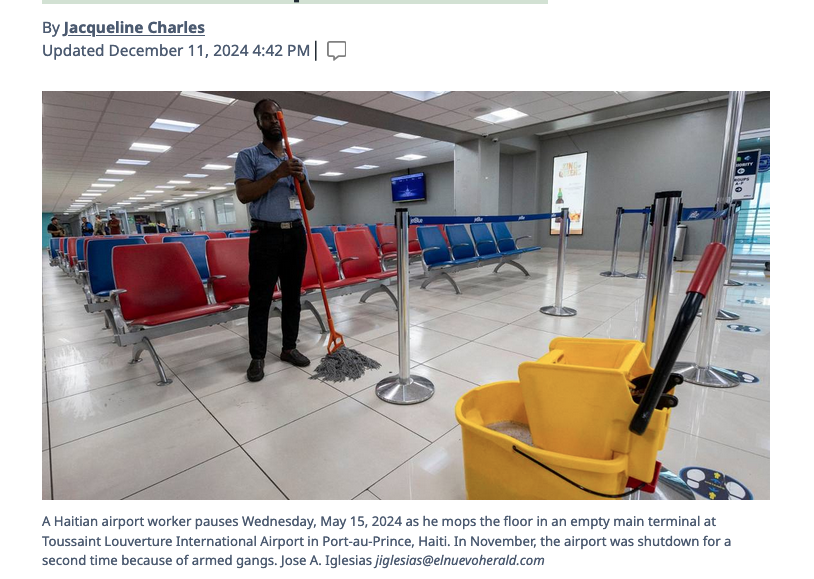
The Federal Aviation Administration has extended a ban on U.S. commercial and cargo flights traveling to Port-au-Prince and other areas of Haiti until March 12, 2025. The decision came on the same day that Haitian authorities officially reopened Toussaint Louverture International Airport and the Guy Malary terminal for domestic flights. Both operations were shut down last month after armed gangs shot at Spirit Airlines, JetBlue Airways and American Airlines as they were traveling above Port-au-Prince airspace. The Nov. 11 attack prompted a 30-day ban from the FAA, which days later amended it to exclude the Hugo Chavez International Airport in the northern city of Cap-Haitien. The FAA’s ban was set to expire on Thursday. But hours after Haiti’s Transitional Presidential Council released a statement on X claiming that their measures had led the FAA to lift the ban, the U.S. agency released a statement saying it will renew its Notice to Air Missions prohibiting operations below 10,000 feet in specified areas of Haiti until March 12. Similar bans from Canadian, French and British authorities are also set to expire between Saturday and Sunday.
Spirit Airlines, JetBlue Airways and American Airlines were struck by gang gunfire on Nov. 11. No passengers were hurt during the incidents, although a flight attendant on board Spirit Airlines Flight 951 out of Fort Lauderdale-Hollywood International Airport did sustain minor injuries after the aircraft was riddled with bullets as it prepared to land. No passengers were hurt during the Nov. 11 incidents, although a flight attendant on board Spirit Airlines Flight 951 out of Fort Lauderdale-Hollywood International Airport did sustain minor injuries after the aircraft was riddled with bullets as it prepared to land.
The incident forced several aircraft en route to Haiti to be diverted, and led Haitian authorities to shut down the capital’s airports for the second time this year because of gang attacks. The operator of Haiti’s main commercial airline, Sunrise Airways, has indicated that even though he is able to resume domestic flights, he is seeking assurances from local officials on measures to prevent future incidents. Airline operators also face higher insurance costs to operate flights in Haiti, another deterrent. In a note on X, the office of the prime minister said they have taken measures to reinforce security at the airport, rehabilitate of roads around the airport. The country’s escalating violence has left 5,000 dead so far this year, the United Nations said this week, and the situation remains volatile. On Monday afternoon, a passenger minibus traveling on a national road toward the capital was shot up, killing several people and injuring others.
On Tuesday, armed gangs carried out another massacre in the country’s Artibonite region. On Sunday, American Airlines told the Miami Herald that it was indefinitely suspending its daily service between Miami International Airport and Toussaint Louverture International Airport due to the deteriorating security situation. Last month, American, JetBlue Airways and Spirit Airlines announced a suspension of all daily service into Haiti after the shooting incidents. Bahamas Air also placed its flights on hold. American said at the time it would resume flights in early February, but a spokesperson on Sunday confirmed to the Herald that this will no longer be the case and the company would revisit the matter in late 2025. Both Spirit and JetBlue have not yet said if or when they will resume flights to Haiti. The ban on flights and the airport closures have left Haitians stranded in and out of the country. The Hugo Chávez International Airport in the northern city of Cap-Haïtien, which was exempted from the FAA’s ban, remains operational but traveling from the city to other parts of Haiti has been almost impossible this week. Torrential rain over several days has grounded private helicopters charging $2,500 a seat, and dangerous mudslides and floods have blocked routes along two main highways.
